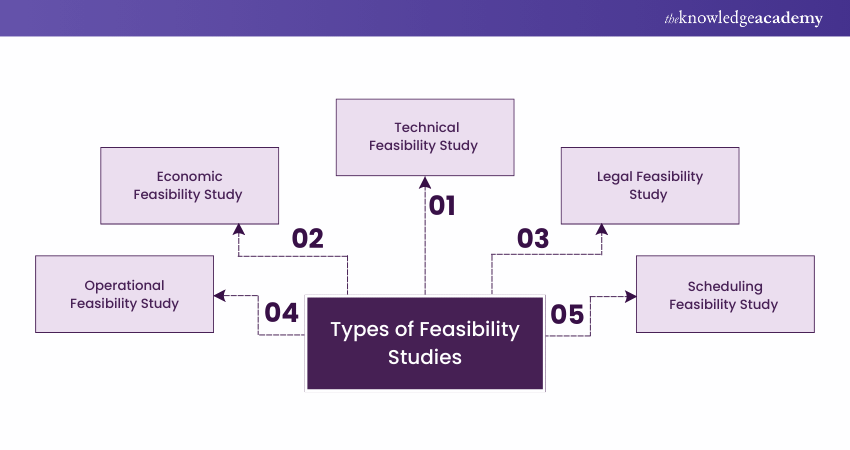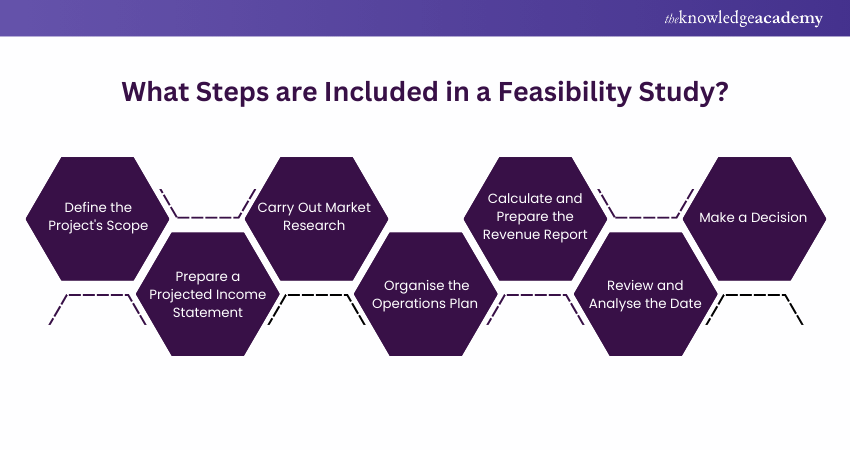We may not have the course you’re looking for. If you enquire or give us a call on +44 1344 203 999 and speak to our training experts, we may still be able to help with your training requirements.
We ensure quality, budget-alignment, and timely delivery by our expert instructors.

Before starting any project, understanding What is a Feasibility Study is essential to determine whether the idea is practical, achievable, and worth pursuing. A Feasibility Study is a crucial assessment that is conducted to determine the viability and potential success of a project.
By thoroughly examining such factors, stakeholders can make informed decisions regarding the project’s feasibility. Apart from the technical and financial considerations, this study ensures a project’s compliance with relevant laws, regulations and industry standards.
To give you a better overview, this blog will talk about the multiple aspects associated with this. So, let’s dive in to learn What is a Feasibility Study. After reading this blog, stakeholders can make well-informed decisions that enhance the chances of a project’s success.
Table of Contents
1) Feasibility Study - An Overview
2) Benefits of Conducting a Feasibility Study
3) Types of Feasibility Study
4) What is Included in a Feasibility Study Report?
5) Seven Steps to do a Feasibility Study
6) Examples of a Feasibility Study
7) How Reliable are Feasibility Studies?
8) What Percentage is a Feasibility Study?
9) Conclusion
Feasibility Study - An Overview
A feasibility study analyses all aspects of a business proposal, including economic, legal, and technical factors. This in-detail assessment helps businesses determine if they can successfully complete a project and if the expected results justify the resources used. It also identifies potential issues that can be addressed before implementation. Upon completing a feasibility study, businesses can decide whether to proceed with or abandon a project.
Feasibility varies by industry and business goals. For example, one company might measure success by return on investment (ROI) or revenue, while another might focus on customer loyalty and retention. Feasibility studies are applicable to various decisions, from major policy changes to small team assignments.
Benefits of Conducting a Feasibility Study
Conducting a feasibility study before launching a new project offers several key benefits:
a) Confirms market opportunities and target market before committing significant resources.
b) Identifies potential issues and risks early in the process.
c) Provides detailed data for better decision-making regarding the project's viability.
d) Documents expected costs and benefits, including financial analysis.
e) Demonstrates due diligence, gaining stakeholder buy-in.
Feasibility studies are crucial for projects that require substantial investments or have a major impact on your market presence.
As a project manager, you might not directly handle the feasibility study, but understanding its elements can help you support the team conducting it and ensure the best outcomes for your project.
Types of Feasibility Study
There are many factors to consider when determining project feasibility. You might conduct various types of feasibility study to assess your project from different angles.

Technical Feasibility Study
A technical Feasibility Study aims to verify whether the organisation is eligible to use its technical in-house resources and expertise to perform successfully. This assessment involves scrutinising various aspects, including the following:
a) Production Capacity: Does the company have the resource base to produce that number of products and services for the customers?
b) Facility Needs: Will today’s facilities fulfil the standards required, or will new facilities be constructed?
c) Raw materials and Supply Chain: Are there enough purchases, and have the organisation maintained a supply chain?
d) Regulatory Compliance: Does the Project Execution follow the relevant guidelines and professionals bear the relevant certifications to meet the requirements and the industry standards?
Economic Feasibility Study
It is a financial Feasibility Study that primarily examines the project's financial viability. The economic Feasibility Study typically involves several steps:
a) Determining Capital Requirements: Calculate funding collection, overhead, and other capital.
b) Cost Breakdown: Determining and listing all the project costs including the purchase of materials, hardware, labour, and overheard costs are too.
c) Funding Sources: Trying out a variety of possible solutions like banks, stakes, or grants.
d) Revenue Projection: By using prediction tools such as a cost-benefit analysis or business forecasting to get the level of income, return on investment and profit margin.
e) Financial Analysis: Projecting the performance of the Project based on means that are related to a financial analysis and are characterised by the utilisation of such things as cash flow statements, balance sheets and financial projections.
Learn the tools and methods to manage projects by signing up for our Running Small Projects Training now!
Legal Feasibility Study
Legal Feasibility is a type of analysis that seeks to confirm that a pProject follows all the relevant laws and regulations. Key considerations include:
a) Regulatory Compliance: Briefing the whole project team about all required laws and regulations that the project has to comply with.
b) Business Structure: Assessing the legal systems (e.g., LLCs vs. corporations) that would best protect liability, governance, and minimising taxation, if any.
Operational Feasibility Study
An operational Feasibility Study looks at how effectively a product will meet its needs. It also talks about how easy it will be to use and maintain once it is in place. In addition, this study enumerates the necessity of evaluating a product's utility and the response and suggestions of application development team.
Scheduling Feasibility Study
Proposed project schedules and deadlines are the main subject of a scheduling a Feasibility Study. This evaluation concerns how long team members will need to complete the project. It also highly impacts the business because if the programme isn't finished on time, the planned result might not be realised.
Acquire the necessary skills to effectively deliver projects by signing up for our Project Management Office Fundamentals Training now!
What is Included in a Feasibility Study Report?
The results of your project feasibility study are gathered in a feasibility report, which typically includes these elements:
a) Executive summary
b) Description of the product/service
c) Technology considerations
d) Product/service marketplace analysis
e) Marketing strategy
f) Organisation and staffing
g) Project schedule
h) Financial projections
i) Findings and recommendations
Seven Steps to do a Feasibility Study
As Feasibility Study is a crucial step in determining the potential of a project, it involves a substantial period of time and resources. Let’s take you through some of the steps involved in the following points:

1) Do a Preliminary Analysis and Define the Scope of the Study
Before going through a Feasibility Study, it is wise to do just one small check. The time and resources involved in Feasibility Studies may be burdensome; hence, it is imperative to determine if it is worth it as early as possible.
Through this form, one can establish whether the study holds awarding potential and who else should be involved on a higher level. You further this stage by answering questions like what you might win, what pitfalls you will face, and what you need for the success of the project.
2) Prepare a Projected Income Statement
First, while doing a Feasibility Study, you should obtain the income statement projection. In this, the statement calculates earnings and expenditures in subsequent one-year amounts. It is made up of the sum of what you will surely get and the cost you will need to cover.
Smaller businesses tend to need marketing strategies to grow into bigger companies. These facts are extremely important because they help business owners make smart decisions regarding the stage of the business.
3) Carry Out Market Research
Market research is of paramount importance or, naturally, it will be of no use when developing the Feasibility Study. Primarily, it operates to ascertain the viability of the project. This point tells you time, which gives you knowledge of the current market state: Who your customers are, who your competitors are, how big the market is, and how many of it you could have. One way of doing this market research is by asking people questions, referring to experts, and checking very broad social media and other public info to find out what's going on.
4) Organisation and Operations Plan
Once you've figured out how the market behaves and the scope of your organisation, you can draft the setup of your plan. The detailed work plan for the project will provide the answer to how it will work in a practical form. It tests three aspects of your project, like whether it can be run, whether it is cost-effective, whether it complies with the law, and whether the technology fits.
This is to help you comprehend everything you can do and what you may require getting this project going, for example, the equipment, the materials to start the project, additional costs, and if you need to hire or train people. If you need to, you may make that change if the information you have brought is enough.
5) Calculate and Prepare the Initial Balance of Expected Revenue and Expenses
In this step, you must be an expert in handling things from the financial part. You’ll make estimates on how much you may initially spend starting up your project, and then how much your project could make and spend based on that estimate. Among the many issues involved are the amount of money you receive from your customers, money you owe to others, and assets that you own.
Fixed costs, such as variable costs that will change based on the number of goods you produce, and equipment costs also need to be factored in money you may borrow or pay for land and service other companies. Keeping this in mind, you should also consider your business’ off seasons and how much risk you are willing to take. These calculations save a lot of time and effort and can be used to answer the most difficult questions of Feasibility.
6) Review and Analyse all Data
After going through all the steps, it's crucial to do a thorough review and analysis. This helps ensure that everything is in order and there's nothing that needs adjusting. Take a moment to carefully look back at your work, including the income statement, and compare it with your expenses and debts. Ask yourself: Does everything still seem realistic?
This is also the perfect opportunity to consider any risks that might come up and create contingency plans to handle them. By doing this, you'll be better prepared for any unexpected challenges that may arise.
7) Make a go/No-go Decision
Now, it's time to decide if the project can work. This might seem simple, but all the work you've done so far leads up to this moment of decision-making. Before making the final call, there are a few more things to think about. First, consider if the project is worth the time, effort, and money you'll be putting into it. Is the commitment worth it?
Secondly, think about whether the project fits with what your organisation wants to achieve in the long run. Does it align with the organisation’s strategic goals and plans? These factors are essential to consider before making your decision.
Examples of a Feasibility Study
To better understand the concepts behind feasibility assessments, here are two hypothetical examples showing how these studies can be applied in real-world scenarios.
University Science Building Upgrade
This example is about a university that wanted to upgrade its old science building from the 1970s. They thought it was outdated and needed a change. To implement this, they evaluated different options and determined how much they would approximately cost. Some people were worried about the project being too expensive or its potential to cause issues in the community. The study also analysed what technology the new building would require, how effectively it would help students, and if it would attract more students.
Along with this, they looked at the financial aspect too, as to how they would sponsor for it and if they would make more money from having additional students. The study showed that the project could work, so they went ahead with the upgrade.
High-speed Rail Project
This example is timed when the Washington State Department of Transportation wanted to see if they could build a fast train connecting Vancouver, Seattle, and Portland. To initiate this, they first focused on how to make decisions about the project in the future.
They discussed it with several people and groups to ensure everyone was okay with the plan. Later, they looked at how to pay for it and thought it would cost between $24 billion and $42 billion. They would get money from the government and maybe from loans and investors.
The study showed that the train could bring lots of good things like better jobs and less traffic. They started looking into this in 2016 and finished the study in 2020. They then shared the report with the government.
Attain the skills to become a stellar Project Manager by signing up for our Project Management Courses now!
How Reliable are Feasibility Studies?
Feasibility studies are generally reliable as they provide a thorough analysis of various aspects of a proposed project, including economic, legal, and technical considerations. Their reliability depends on the accuracy of the data collected and the methodologies used in the assessment.
While feasibility studies can't eliminate all risks, they significantly reduce uncertainties and help businesses make informed decisions by identifying potential issues early in the project planning process.
What Percentage is a Feasibility Study?
Feasibility studies typically do not have a fixed percentage. They have a thorough evaluation of the project's viability. However, some organisations may assign a specific confidence level to their feasibility studies, such as an 80% or 90% probability of success.
This will be based on the thoroughness of their analysis. The percentage can vary depending on the complexity of the project, the quality of data, and the assumptions made during the study.
Conclusion
You are now more familiar with how a well-executed Feasibility Study is a cornerstone of informed decision-making in Project Management and business ventures. It acts as a critical guide, helping organisations assess the practicality and viability of their initiatives, ultimately minimising risks and increasing the likelihood of success.
Understand effective troubleshooting methodologies to address diverse IT issues with our IT Support and Solution Training – Join today!
Frequently Asked Questions

Employers value skills like analysis, problem-solving, attention to detail, and communication in Feasibility Study specialists. They need to be good at crunching numbers, finding solutions, and explaining complex ideas clearly.

Many industries need expertise in feasibility studies, such as construction, healthcare, tech, and more. It helps decide if projects are doable.

The Knowledge Academy takes global learning to new heights, offering over 30,000 online courses across 490+ locations in 220 countries. This expansive reach ensures accessibility and convenience for learners worldwide.
Alongside our diverse Online Course Catalogue, encompassing 19 major categories, we go the extra mile by providing a plethora of free educational Online Resources like News updates, Blogs, videos, webinars, and interview questions. Tailoring learning experiences further, professionals can maximise value with customisable Course Bundles of TKA.

The Knowledge Academy’s Knowledge Pass, a prepaid voucher, adds another layer of flexibility, allowing course bookings over a 12-month period. Join us on a journey where education knows no bounds.

The Knowledge Academy offers various Project Management Courses, including Introduction to Project Management Certification Course and Project Management Masterclass. These courses cater to different skill levels, providing comprehensive insights into Project Resource Management.
Our Project Management Blogs cover a range of topics related to Project Management Skills, offering valuable resources, best practices, and industry insights. Whether you are a beginner or looking to advance your skills in Project Management, The Knowledge Academy's diverse courses and informative blogs have you covered.
Upcoming Project Management Resources Batches & Dates
Date
 Introduction to Project Management Course
Introduction to Project Management Course
Fri 14th Mar 2025
Fri 9th May 2025
Fri 15th Aug 2025
Fri 10th Oct 2025
Fri 12th Dec 2025







 Top Rated Course
Top Rated Course



 If you wish to make any changes to your course, please
If you wish to make any changes to your course, please


